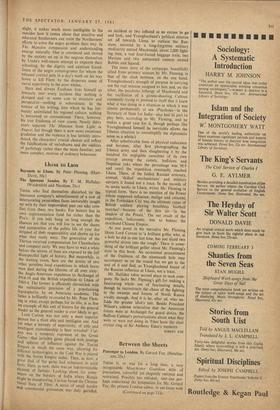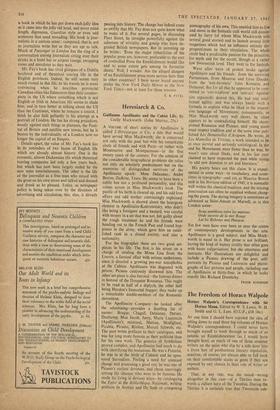Between the Sheets
THERE is, or was for a long time, a very recognisable Manchester Guardian style of journalism, colourful yet elegantly rational and restrained. Possibly too rational: one' can per- haps understand the temptation for Mr. Gerard Fay, the present London editor, to cut loose with
(Continued on page 114)
a book in which he has put down each jolly idea as it came into the jolly old head, and never mind length, digression, Guardian style or even odd sentences that need rereading. His book is jour- nalistic in a curious sense: composed, that is, not as journalists write but as they are apt to talk. Much of Passenger to London has the ring of a conversation among journalists sitting over their drinks in a hotel bar or airport lounge, swopping views and anecdotes as they wait.
Mr. Fay's book has vivid glimpses of a Dublin boyhood and of theatrical touring life in the English provinces. Indeed, he still seems very much rooted in this life. In his travels he is more convincing when he describes provincial Canadian cities like Edmonton than their counter- parts in the US where something which is not English or Irish in American life seems to elude him; and in turn better at talking about the US than the Continent, where he remains a tourist. I think he also fails gallantly in his attempt at a portrait of London. He has his strong prejudices, mostly against such things as planners, the Festi- val of Britain and satellite new towns, but he is beaten by the individuality of a London now no longer the capital of an Empire.
Details apart, the value of Mr. Fay's book lies in its reminders of two facets of English life which are already almost history. One is the romantic, almost Dickensian life which theatrical touring companies led only a few years back, but which has now been largely ended by the new mass entertainments. The other is the life of the journalist as a free man who mixed with the great on his own terms and talked and dressed and drank as he pleased. Today, as newspaper policy is being taken over by the directors of advertising and circulation, this, also, is already
passing into history. The change has indeed come so swiftly that Mr. Fay does not quite know what to make of it. For several pages, in discussing Fleet Street, he inveighs powerfully against the salesmen of triviality and gossip who have de- graded British newspapers. But in summing up he writes: 'Even the major imbecilities of the popular press are, however, preferable to the sort of controlled Press the Establishment would like and to some extent gets among its favourite sheets.' Well, I wonder. Are the alleged dangers of an Establishment press more serious here than in other countries? I have never heard anyone prefer the New York Daily Mirror to the New York Times—not at least for these reasons.
T. R. FY VEL











































 Previous page
Previous page